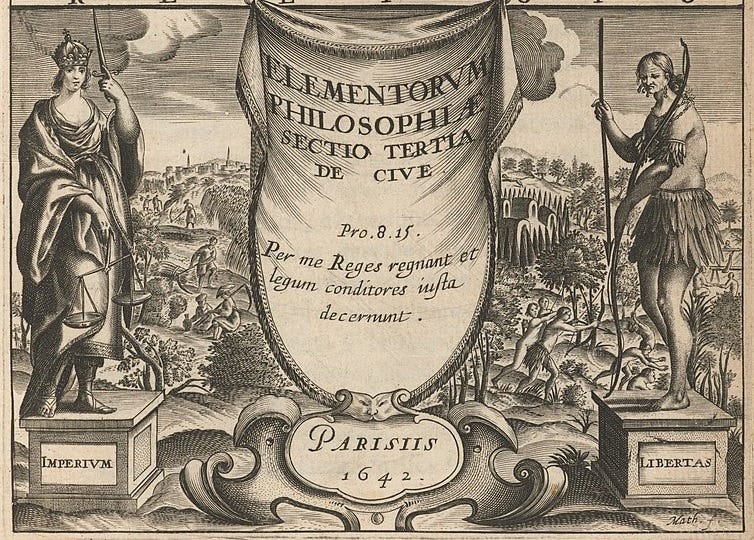
Thomas Hobbes’ writings might seem an unlikely place to find valuable insights into the centrality of work. His philosophy is often thought of in terms of the grand scale theoretical architecture of politics, not in terms of the everyday life of the actual people who live in his commonwealth. Work for Hobbes is, however, one of those interesting topics which overlaps the boundary between everyday life and political theory.
As a matter of fact, Hobbes address ‘work’ in each of his major writings. For instance, he writes in De Cive that human labour, besides ‘the fruits’ provided by the earth and the sea, is one of the two things most necessary for the “enriching of subjects” (p.149). Hobbes seems to take this ‘enriching’ potential of work very seriously, at least seriously enough for him to make the following demand on the state when subjects are unable to find work:
“[W]hereas many men, by accident unevitable, become unable to maintain themselves by their labour; they ought not to be left to the Charity of private persons; but to be provided for, (as far-forth as the necessities of Nature require,) by the Lawes of the Common-wealth. For as it is Unchariablenesse in any man, to neglect the impotent; so it is in the Soveraign of a Common-wealth, to expose them to the hazard of such uncertain Charity.” (Leviathan, p.538)
This ‘public charity’ seems best understood as what we would call social welfare and is perhaps not something we would think typical of Hobbes. We might want to explain this in a more ‘Hobbesian’ fashion by reading this as a way to prevent the population from having too much time and energy on their hands. In other words, this may be Hobbes’ way of cutting off the conditions for civil unrest.
One key term Hobbes uses, ‘idleness’, suggests this reading might be accurate. ‘Idleness’ and work have a long, and often unsettling, history. Throughout the history of ideas we see ‘idleness’ put forward as a cause of civil unrest and, in this pejorative sense, it is precisely the kind of thing Hobbes spends so much of his main works trying to prevent. As such, Hobbes’ call for ‘public charity’ might not be emerging from any properly charitable concern at all but merely from an instrumental concern for stability.
Perhaps this is correct, but there are at least a couple of reasons why we might think that it is not the entire story.
For one, the paragraph following on from the above quote shows that to qualify for this ‘public charity’, the “accident unevitable” would need to incapacitate the subject, making them literally unable to work and - we can safely presume - equally unable to fight against the will of the sovereign. By contrast,
“for such as have strong bodies, the case is otherwise: they are to be forced to work.” (Leviathan, p.540)
How are those capable of it to be ‘forced to work’? He expands:
“[T]o avoid the excuse of not finding employment, there ought to be such Lawes, as may encourage all manner of Arts; as Navigation, Agriculture, Fishing, and all manner of Manifacture that requires Labour.” (ibid.)
So those that can’t work should be ‘provided for’, and those that can work should be ‘encouraged’ to find some. Why though, would Hobbes be so keen to look after the subjects living in society if not simply to prevent them from acting as a threat to his commonwealth? As he himself states,
“All the duties of sovereigns are implicit in this one phrase; the safety of the people is the supreme law”. (De Cive, p.143)
The Sovereign’s duty is to keep the subject alive, that is his side of the bargain, to protect his people from the threat of others. In exchange, they give him complete obedience. This is the foundation of the ‘orthodox’ reading of Hobbes’ philosophy and from this vantage point it isn’t clear why he would be so concerned about the work of subjects.
This view of Hobbes’ thought isn’t incorrect as such, the state of nature isn’t a great place to be and there is therefore a large, if negative, incentive for people to join civil society. But it is not the whole story. Yes, Hobbes does say that it is the duty of the sovereign to ensure that subjects are kept ‘safe’. But, the way he explicates this is not a negative reason, the escape from the horrors of the state of nature, rather he gives an entirely positive reason:
“All the duties of sovereigns are implicit in this one phrase; the safety of the people is the supreme law... By safety one should understand not mere survival in any condition, but a happy life so far as that is possible.” (De Cive, p.143)
As we saw above, such happiness will be achieved, for those who are able, through their work. After all,
“What grieves and discontents the human spirit more than anything else is poverty; or want of the essentials for the preservation of life and dignity.” (De Cive, p.137)
As we also saw, the duty to work that befalls them, as the other side of their right to happiness, is to be realised by the state through economic policies favouring full employment:
“Hence [the ruler] has done his duty if he has made every effort, to provide by sound measures for the welfare of as many of [his subjects] as possible for as long as possible.” (De Cive, p.143)
Thomas Corbin
Image
Frontispiece (bottom half) of the 1642 edition of Elementorvm Philosophiae Sectio Tertia de Cive (De Cive ), Houghton Library, Harvard University.



